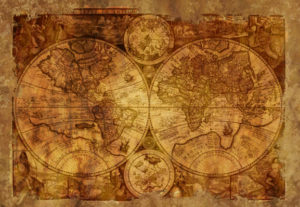
This month I started a one-year Bible reading plan. I’m already behind. I can’t help it. I have questions. Like why does the theme of scattering keep coming up? What’s bad about not scattering? And why should we care about it today?
I don’t have all the answers, but I’ve learned a few things. I hope you find them useful, too.
God’s first commandment to Adam and Eve is to be fruitful, multiply, and fill the earth (Genesis 1:28). After God preserves Noah through the Flood, He tells Noah the same thing (Genesis 9:1). Just three generations later, Noah’s great-grandson Nimrod disobeys God’s missive.
Nimrod was “a mighty man” (Genesis 10:8-12)—and apparently mighty charismatic to persuade oodles of people to build the Tower of Babel. To what end? “Let us build ourselves a city, with a tower that reaches to the heavens, so that we may make a name for ourselves; otherwise we will be scattered over the face of the whole earth” (Genesis 11:4, NIV).
Nimrod’s gathering and self-aggrandizement plans stood in the way of God’s eternal plan, so God confused everyone’s language to ensure they scattered.
(FYI: Historical linguistics can trace language origins a certain point—then they hit a wall. That plus archaeological evidence support the validity of the Genesis account of Babel.)
In Genesis 46, Jacob and his kin move to Egypt—but not just for a family reunion with Joseph. If Jacob’s family had stayed in Canaan, it would have been too easy for them to intermarry and adopt pagan practices, both of which God abhorred. Jacob’s offspring were destined to become Israel, so God moved them to Goshen where they could prosper, minus outside influence. You see, Egyptians considered shepherds unclean and wouldn’t even eat at the same table with a Hebrew. Pharaoh allowed Joseph to give Jacob a chunk of Egypt’s choicest land—away from Pharaoh’s hub. Almost four hundred years later, when the fledgling Israelite nation exited Egypt en masse, the whole country learned about God in one night. Residents of other nationalities that had believed in Yahweh left with the Exodus (see Exodus 12:38).
Scattering was God’s plan all along
See the pattern? God scatters so His name will be known throughout all the earth.
Throughout history, God scattered the Israelites by having foreign countries invade and take them captive. After the Diaspora, major Jewish centers emerged in Alexandria, Asia Minor, and Babylonia. God’s Word spread.
Interestingly, while Daniel was in Babylonian exile, he saw God’s perfect plan of scattering in a vision:
And to him [Jesus] was given dominion and glory and a kingdom, that all peoples, nations, and languages should serve him; his dominion is an everlasting dominion, which shall not pass away, and his kingdom one that shall not be destroyed (Daniel 7:14 ESV).
God scattered the early first-century Church through persecution. Otherwise, they might have been content to stay in the nexus of Jerusalem instead of fulfilling the Great Commission.
In Revelation, John glimpses the ultimate result of God’s scatterings:
I looked, and behold, a great multitude that no one could number, from every nation, from all tribes and peoples and languages, standing before the throne and before the Lamb … (Revelation 7:9 ESV).
What does scattering mean for me?
By now you may be saying something like, “That’s nice, but what does that mean for me? Don’t pitch to me about becoming a missionary.”
That’s not my intention.
Here’s my takeaway: God wants you to scatter your time, talent, and treasure for Him. Regardless of what that looks like, He doesn’t want you to keep it to yourself.
You don’t have to become a minister or a missionary to do that. Ask God to show you what, where, and how He wants you to scatter.
That will look different for everyone.
But everyone can tell people naturally in conversation what God has done for them.
Just don’t keep in a box what God wants you to scatter.
Years ago, I overheard some church friends say how they couldn’t possibly let new people into their Bible study—or even think about dividing the Bible study into two groups. “We’re too close.” “We’ve shared too much with each other.” “No one will understand what we’ve been through.”
Maybe.
BUT.
Friends, that’s a modern-day Nimrod problem.
Sometimes scattering is lonely. Shortly before COVID hit, I moved to a city where I didn’t know anyone. I’m at least three states and more than a full day’s drive away from all the friends I’ve known the longest and am closest to. I don’t know what God has planned for me here—only that He’s called me here.
Throughout the Bible, that’s God’s MO. “Scatter. Details to follow.”
Father God, You are infinite in wisdom. What do You want me to scatter? Tell me where and how. Assure me that I’m doing what You have planned for me—because whatever and wherever that is, it’s the best way to live. In Your precious Name, Amen.
Never miss a post!





This touched me deeply. I’m about to speak to a group I’m India I was looking up the Word scatter; in my study Mark5:1-9. Matt 13:1-9. Luke 8:4-8. Thank you
Many blessings to you in your ministry!
Thanks Lana, great post. It took me more than three years to read the bible through, for the same reason LOL. 1Pe 1:1 Peter, an apostle of Jesus Christ, to the elect sojourners of the DISPERSION…
Thank you for your kind words, Yvonne. I think we tend to overlook those types of details in the Bible because we naturally want more security and stability than that. But God usually has other plans!